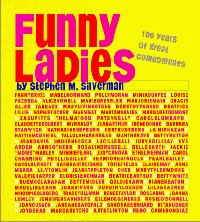 When I picked up this book at Hooked on Books last year, I might have though the book was authored by Sarah Silverman, who is a comedienne and might have collected stories of those who came before her (even though in the Good Book Hunting post, I got the author’s full name). I say I might have then, because when I’ve seen it on the bookshelves between then and now, I’ve had the same thought. But it’s by a dude who’s been a reporter and a celebrity book writer for a while by 1999.
When I picked up this book at Hooked on Books last year, I might have though the book was authored by Sarah Silverman, who is a comedienne and might have collected stories of those who came before her (even though in the Good Book Hunting post, I got the author’s full name). I say I might have then, because when I’ve seen it on the bookshelves between then and now, I’ve had the same thought. But it’s by a dude who’s been a reporter and a celebrity book writer for a while by 1999.
At any rate, the book collects short bios about a number of comediennes (I wrote it again because I’m pleased I know how to spell it) from the various 20th century media (including theatre, which is not media per se, and I put those in italics because the italic store had a discount). It runs roughly in chronological order, with women from vaudeville and burlesque through women on The View (Which is 23 years old now? Crazy!).
You’ve got Fanny Brice (and Barbra Streisand, who gets into the book by virtue of playing Fanny Brice). You’ve got Gracie Allen, which reminds me I have more George Burns to read, and I should. You’ve got Mae West, Lucille Ball, Dorothy Parker, Sophie Tucker, Tallulah Bankhead, Carol Burnett, Totie Fields, and so on. When we get to the modern era, we’ve got Roseanne Barr, Tracey Ullman, Ellen, Rosie O’Donnell, Rita Rudner, Margaret Cho, Whoopi Goldberg, and so on. Apparently, Joy Behar was considered a comedienne (I really hope I’ve spelled it right because I made a point of saying I did) at some point.
On the one hand, like Whatever Became Of…?, it makes me realize how many movies from the early part of the century I missed.
The book talks about all the things that the comediennes did in the early part of the century, movies and theatres and television series, but the latest in the book have much thinner resumes. I mean, Whoopi Goldberg has Ghost, The Color Purple, Star Trek: The Next Generation, Sister Act, and Eddie (knowing this last might make me a Whoopi super fan). I like Rita Rudner, but aside from a book and some cable stand-up shows, what does she have? Not to mention Margaret Cho–she had a short-lived television series, I recall.
But after the 1970s, the funny ladies are all a little more, erm, political–as is this book. We get to the 1970s, and suddenly there are jabs at Nixon (“Richard Nixon appointer her [Pearl Bailey] the country’s unofficial Ambassador of Love, one of the few nonpartisan things he ever did.”) and digs at conservatives. And, of course, even beyond 1999, we’ve seen how political comedy has become.
Of course, twenty years after this book, we see what has become of the then-young modern funny ladies (which is easier to spell than comedienne). Mostly talk shows and not a lot of movie credits. It’s a different career now than it was then, I suppose, and the media have changed. These women can maybe get by with an occasional book and movie where the women of the 1940s had lower salaries and had to hustle more, which leads to lengthier IMDB entries.
At any rate, it’s a pleasant book. I wish I would remember more of it than I will; perhaps if I get into actually watching these women, I’ll remember them better.


